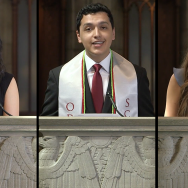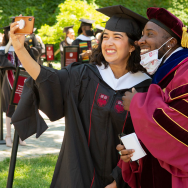In her address to the University of Chicago’s Class of 2021, Prof. Deborah Nelson reflected on this unusual moment in history: As graduates enter the world, they have a unique opportunity to build something new.
“We need a new world. We can’t go back to normal, whatever that was,” said Nelson, the Helen B. and Frank L. Sulzberger Professor of English. “And you need to do it … with confidence and humility, a sense of authority and a recognition of your own limitations. You already know how to do it. Teach the rest of us.”
Nelson delivered her address as part of Convocation, the annual “calling together” of the University community. The June 9 virtual ceremony kicked off five days of events this week celebrating this year’s graduates. The undergraduate College will honor its graduates in a Class Day event at 2 p.m. CT on June 11, with diploma and hooding ceremonies for graduate schools, divisions and the College continuing through June 13.
In his remarks, President Robert J. Zimmer hoped this year’s graduates felt “a collective sense of pride and unity” in their achievements, given the challenges of the past year. He also reminded them of the importance of Convocation, which he said UChicago’s first president, William Rainey Harper, viewed as a “nourishing part of the life of a university.”
“Convocations are meant to bind together into a unity the many complex and diverging forms of activity which constitute our University’s life and work,” said Zimmer, presiding over his 15th and final Convocation as UChicago president. “And, in addition, it affords us all a moment to reflect upon the accomplishments of our past and the opportunities of our future—individually, collectively and institutionally.”
‘Changing your mind requires courage’
An expert on late-20th century American literature, gender and sexuality studies, and Cold War history, Nelson framed her address around two concepts from political philosopher Hannah Arendt: possessing a world in common, and plurality.
A German Jewish philosopher who escaped the Nazis after spending months in a French internment camp, Arendt later moved to New York City and taught at a number of American universities, including UChicago.
Nelson said those experiences in Europe informed Arendt’s intimate understanding of pain and interpersonal connection: “[Arendt] knew that suffering itself—from a pandemic, from economic dislocation, from war and violence—deprived people of the resilience they needed to engage with others in making a common world.”
Even during a pandemic, Nelson continued, universities can help create a “world in common,” exposing students to diverse people and ideas. A transformative education from the University of Chicago can be a powerful tool, she said, one graduates can use to keep themselves open to new concepts and stay intellectually and politically engaged, ready to meet future collective challenges. “Sharing of the world is not an inborn talent,” Nelson said, but “a discipline and a habit of mind.”
“Changing your mind requires courage,” she added.
Students who arrive at UChicago quickly learn how much more interesting (and fun) it can be to listen to their classmates—to imagine something new together, rather than simply becoming better debaters, Nelson said. She encouraged the graduates to hold on to this “highly developed capacity” for sharing the world, and to make positive change in the wake of the pandemic.
“We lose something essential to living in a democracy when we lose contact with humanity in all its plurality,” she said. But rededicating ourselves to plurality should dovetail with compassion: The ability to listen to each other, Nelson added, is something we too often forget. She stressed that moving forward requires us to ask others: “What are you going through?”
The 534th Convocation ceremony was recorded on campus in May, in accordance with safety guidance from the CDC and state and local authorities.
In his remarks, Zimmer thanked graduates for their sacrifices to protect the health and well-being of others during the pandemic. He expressed hope that the UChicago community will soon be able to celebrate together again.
“We look forward to the time when we can once again call the University of Chicago together on campus so that we may recognize the achievements of our community as a whole, in the original spirit of Harper’s Convocations,” Zimmer said. He later verbally conferred degrees to 3,743 candidates.
In addition to the degrees awarded to this year’s graduates, the University awarded honorary doctorates to six distinguished scholars: physical chemist and quantum technology pioneer Paul Brumer; cuneiform specialist Dominique Charpin; mathematician Jeff Cheeger; biochemist Jennifer Doudna, who shared the Nobel Prize for co-creating the gene-editing technology CRISPR/Cas9; theoretical physicist and quantum computing expert Charles L. Kane; and literary scholar Françoise Lavocat.
Finally, the University recognized faculty members who won the Llewellyn John and Harriet Manchester Quantrell Awards for Excellence in Undergraduate Teaching and the Faculty Awards for Excellence in Graduate Teaching and Mentoring.

